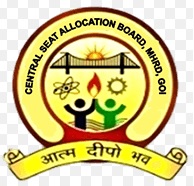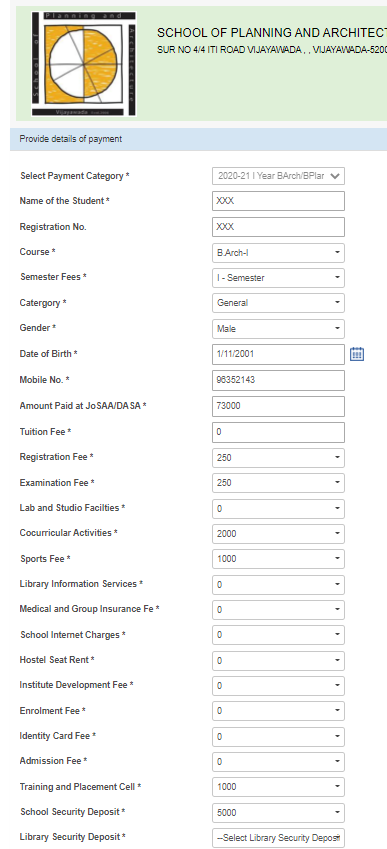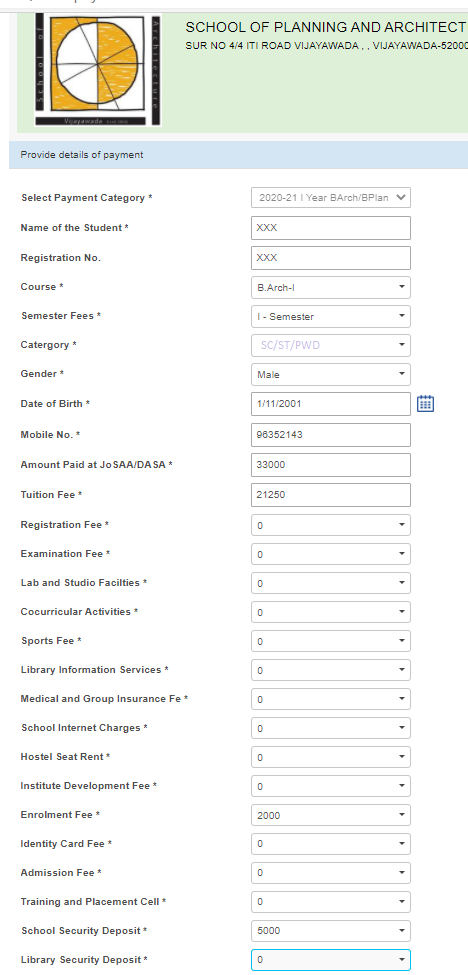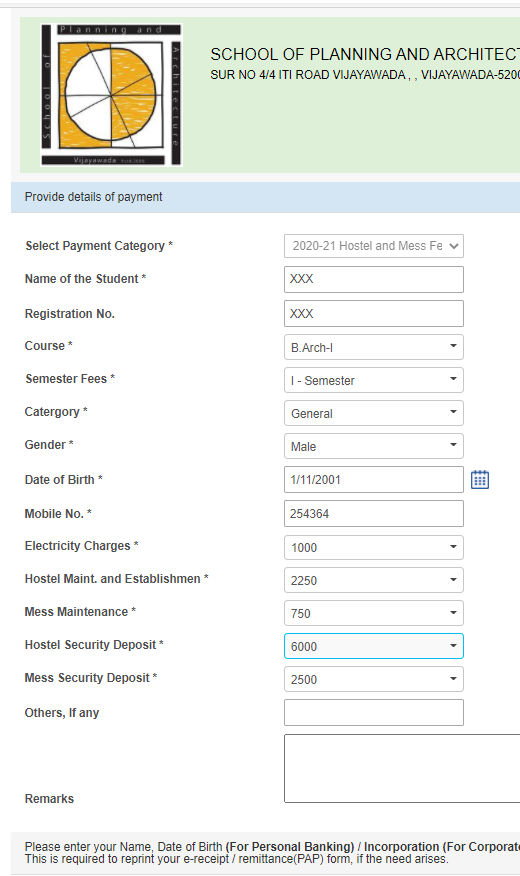| Name of the Programme | Bachelor of Architecture |
| Abbreviation | B.Arch |
| Year of Commencement | 2008 |
| Department | Architecture |
| Duration | Five Years |
| Semesters | Ten |
| Eligibility |
The admission to the Bachelor of Architecture and Bachelor of Planning courses is made on the basis of Joint Seat Allocation Authority (JOSAA 2022). The students have to qualify the basic requirements as per Central Seat Allocation Board (CSAB). The criteria for admission as per CSAB 2022. JOSAA 2022 | CSAB 2022 |
| Intake | 94 + 14 DASA |
| Objective |
The key objective of the programme is to prepare the students for professional practice in the field of Architecture. Being an undergraduate programme, it has a broad scope, providing exposure to a variety of interests in this field and assisting students to discover their own directions for further development. The programme also aims at attaining a high level of excellence in Architectural Design. To this end, the design course is seen as the core of the programme with supportive inputs from courses in other streams viz., the Humanities, the Technological and the Professional, built upon a strong foundation of enabling skills in communications and data processing. The emphasis is on the development of faculties of discernment and decision-making with the aid of both objective information and subjective attitudes, based on reason. |
| Credits | 300 (@30 / semester) |
| Marks | 12000 (@1200/semester) |
| Name of the Programme | Bachelor of Planning |
| Abbreviation | B.Plan |
| Year of Commencement | 2008 |
| Department | Planning |
| Duration | Four Years |
| Semesters | Eight |
| Eligibility |
The admission to the Bachelor of Architecture and Bachelor of Planning courses is made on the basis of Joint Seat Allocation Authority (JOSAA 2022). The students have to qualify the basic requirements as per Central Seat Allocation Board (CSAB). The criteria for admission as per CSAB 2022. JOSAA 2022 | CSAB 2022 |
| Intake | 38 + 6 DASA |
| Objective |
The key objective of the programme is to equip the students with the fundamentals aspects and specialized techniques of spatial planning in a comprehensive manner that ranges from neighbourhood to regional planning. The curriculum is designed to impart basic skills related to settlement patterns, growth and design, that would help students later in their careers to serve in various professional capacities in planning, development and management agencies in the public sector as well as private consultancy organizations. The aim of the programme is multi-disciplinary in nature - drawing from the field of city planning, blending the knowledge from architecture, engineering, geography, economics, sociology, management, law, etc. During the programme, the students are equipped with the knowledge of basic theories, techniques, and design concepts from mainstream of town and country planning. Adequate emphasis is given to practicals / lab oriented design exercises, where the students have opportunity of learning by doing. |
| Credits | 240 (@30 / semester) |
| Marks | 8000 (@1000/semester) |
| Name of the Programme | Master of Architecture (Sustainable Architecture) |
| Abbreviation | M.Arch (SA) |
| Year of Commencement | 2014 |
| Department | Architecture |
| Duration | Two Years |
| Semesters | Four |
| Eligibility |
B.Arch. |
| Intake | 25 + 4 DASA |
| Objective |
The key objective of the programme is to to develop skills,
knowledge and understanding related to environmental
sustainability, construction and building technology, adopting
the principles and practices of sustainable building design,
while responding to environmental challenges such as Climate
change, environmental degradation etc. |
| Credits | 120 (@30 / semester) |
| Marks | 4000 (@1000/semester) |
| Name of the Programme | Master of Architecture (Landscape Architecture) |
| Abbreviation | M.Arch (LA) |
| Year of Commencement | 2018 |
| Department | Architecture |
| Duration | Two Years |
| Semesters | Four |
| Eligibility |
B.Arch. |
| Intake | 25 + 4 DASA |
| Objective |
The key objective of the programme is to develop an overall understanding of the landscape design and its related aspects such as history of landscape architecture, contemporary landscapes, environmental / ecological issues, geological / drainage patterns, watershed, hydrological principles, etc. Besides, the curriculum also deals with natural, cultural, and social systems that affect the design decisions, as well as the language and literature of landscape architecture. |
| Credits | 120 (@30 / semester) |
| Marks | 4000 (@1000/semester) |
| Name of the Programme | Master of Architecture (Architectural Conservation) [Self-Financing Course] |
| Abbreviation | M.Arch (AC) |
| Year of Commencement | 2019 |
| Department | Architecture |
| Duration | Two Years |
| Semesters | Four |
| Eligibility |
B.Arch. |
| Intake | 25 + 4 DASA |
| Objective |
The key objective of the programme is to develop a deeper
understanding of this cultural phenomenon and its association
with integral development of the settlements. A comprehensive
and integrated conservation management and to equip the
students with adequate skills required to comprehend various
aspects that are the determinants of the heritage in all the
contexts. |
| Credits | 120 (@30 / semester) |
| Marks | 4000 (@1000/semester) |
| Name of the Programme | Master of Building Engineering and Management (Self-Financing Course) |
| Abbreviation | MBEM |
| Year of Commencement | 2019 |
| Department | Architecture |
| Duration | Two Years |
| Semesters | Four |
| Eligibility |
B.Arch / B.E. or B.Tech (Civil Engineering or Building &
Construction Technology or Construction Technology or Construction
Technology & Management). |
| Intake | 25 + 4 DASA |
| Objective |
This programme enables the students in acquiring knowledge in state of art construction techniques and other related topics such as Materials, Construction finance, Quality management, Contracting, safety and legal issues, Value engineering, Organization, Human resource management, Advanced technologies and Operational Research. It emphasizes the importance of today’s construction needs for a rewarding management career in infrastructure Construction Industry. |
| Credits | 120 (@30 / semester) |
| Marks | 4000 (@1000/semester |
| Name of the Programme | Master of Urban Design ( M.U.D ) |
| Abbreviation | MUD |
| Year of Commencement | 2022 |
| Department | Architecture |
| Duration | Two Years |
| Semesters | Four |
| Eligibility |
B.Arch. |
| Intake | 25 + 4 DASA |
| Objective |
Urban Design course emerges in recent years globally to broaden the perspectives on Urban interventions in complex urban environments considering various social, behavioral, environmental, historical factor's for formulating design and development strategies. Today cities are under immense morphological transformation, triggered by various factors both planned and unplanned. The course offers documentation of dynamic aspects of growth and transformation in various cities and provides direction for further Urban development. Urban Redevelopment, Urban Renewal, Urban Conservation ono new growth strategies at varying scales through broad range of subjects and interactive design studio projects. |
| Credits | 120 (@30 / semester) |
| Marks | 4000 (@1000/semester |
| Name of the Programme | Master of Planning ( Environmental Planning and Management) |
| Abbreviation | M.Plan (EPM) |
| Year of Commencement | 2013 |
| Department | Planning |
| Duration | Two Years |
| Semesters | Four |
| Eligibility |
B.Planning / B.Arch / B.Tech (Planning or Civil Engineering) /
B.E. (Civil Engineering) / Master’s Degree in Geography or
Economics or Sociology. |
| Intake | 25 + 4 DASA |
| Objective |
The overall objective of the programme is to rationally sensitise the students towards the intricate ecological relationship between nature and human settlements and thereby equip them with adequate skills required to comprehend, analyse and plan for urban and regional issues with the pretext of maintaining ecological balance. This broad aim intrinsically shall involve comprehension of physical, socio-economic, cultural, political and ecological dimensions of the human settlements. It shall focus particularly in recording and interpreting environmental resource baseline and their local and regional capacities to deal with human needs. |
| Credits | 120 (@30 / semester) |
| Marks | 4000 (@1000/semester) |
| Name of the Programme | Master of Planning (Urban and Regional Planning) |
| Abbreviation | M.Plan (URP |
| Year of Commencement | 2014 |
| Department | Planning |
| Duration | Two Years |
| Semesters | Four |
| Eligibility |
B.Planning / B.Arch / B.Tech (Planning or Civil Engineering) /
B.E. (Civil Engineering) / Master’s Degree in Geography or
Economics or Sociology. |
| Intake | 25 + 4 DASA |
| Objective |
The key objective of the programme is to equip the students with adequate skills required to comprehend urban and regional issues and to analyse physical, socio-economic, cultural, political and ecological dimensions of the human settlements. The course is designed to provide necessary exposure to various planning processes, emerging trends and other related advanced technical knowhow. It intends to contribute towards the creation of professionals in the field and hence to cater to the specific needs of the industry and academics. During the course, the students will be provided with ample opportunities to interact with the subject experts, relevant organisations, etc. The course enables the students to gain real time experience through their involvement in the ongoing or live projects. |
| Credits | 120 (@30 / semester) |
| Marks | 4000 (@1000/semester) |
| Name of the Programme | Master of Planning (Transportation& Infrastructure Planning) |
| Abbreviation | M.Plan (TIP) |
| Year of Commencement | 2018 |
| Department | Planning |
| Duration | Two Years |
| Semesters | Four |
| Eligibility |
B.Planning / B.Arch / B.E. or B.Tech (Planning or Civil
Engineering) / Master’s Degree in Economics or Statistics or
Operations Research. |
| Intake | 25 + 4 DASA |
| Objective |
The key objective of the programme is to equip the students with adequate skills required to comprehend transportation and infrastructure related issues. The programme focuses on various key aspects such as urban transportation, public transportation, highway planning, smart mobility, logistics and freight distribution, etc. |
| Credits | 120 (@30 / semester) |
| Marks | 4000 (@1000/semester) |
Information regarding DASA2022 UG Admission: DASA 2022 UG Brochure DASA 2022 UG Brochure IMPORTANT INSTRUCTIONS TO CANDIDATES: REGARDING ADMISSION IN NIT+ SYSTEM Candidates must read and follow the ‘terms and conditions’ carefully, displayed after opting ‘ADMISSION AND PARTIAL FEE PAYMENT’ option. After agreeing to the ‘terms and conditions’ of the admission, they are required to pay the Partial admission fee (Rs. 40000/- for GEN, GEN-EWS, OBC-NCL and Rs. 20000/- for SC, ST, PwD candidates) by clicking the link given on the JoSAA-2020 portal. The partial admission fee can be paid using Net Banking / Debit card / Credit card or State Bank of India e-challan. Candidates are advised to follow JOSAA/CSAB notifications time to time regarding the physical reporting at alloted institute |
| Institute Admissions/Academic section contact number: Academics (Admissions/Fee related) - 0866 2469493 MR. Shyam Kumar PVS - 8106210312 Mr. Bhanu Prakash - 0866 2469448 |
JOSA-2020
 |
CSAB-2020
|
JOSAA/CSAB contact Deputy Center In-charge Dr. Y.S.Rao 9502593300 |
|---|
How to pay fee through SBI collect (Template available below)
| General/OBC | SC/ST/PWD | Hostel & Mess |
|---|---|---|
 |
 |
 |
 |
Candidates Qualified to appear for Online Interview for Direct Admissions into Doctoral Programmes(full time) at SPA Vijayawada
DASA-2020 Online Reporting to SPAV
"Due to COVID-19 pandemic situation, the reporting and admission would be done online for the selected students under DASA-2020 admission during 17-19 November, 2020. For further instruction students are requested to visit the SPAV website regularly."
DASA Co-Ordinator – Dr. Amitava Sarkar(Associate Professor)
Contact No. – +91 7018612392.
DASA 2020 Fee Structure

DASA 2020 - PG Admission
UG Brochure for DASA 2020
Web Notice for Direct Admissions into Doctoral Programmes(full time) at SPA Vijayawada for the Academic Year 2020-21.
PG Direct Admissions- Provisionally selected candidates from waitlist
 Waitlisted candidates
Waitlisted candidates
Instructions to the provisionally admitted candidates for PG Programmes through CCMT-2020 at SPA Vijayawada for the Academic Year 2020-21
List of Eligible and Ineligible applicants for Direct Admissions into Doctoral Programmes(full time) at SPA Vijayawada for the Academic Year 2020-21
Instructions to provisionally selected PG candidates under PG Direct Admissions 2020
Results of PG Direct Admissions for MURP, MBEM, MLA, MAC, MSA,MEPM and MTIP courses
Web Notice for Category and Course Completion Certificates
 1. Web Notice
1. Web Notice 2. Affidavit of EWS Category
2. Affidavit of EWS Category 3. Affidavit of OBC-NCL Category
3. Affidavit of OBC-NCL Category 4. Format of Course Completion
Certificate
4. Format of Course Completion
CertificatePhD admissions- web notice
PG Direct Admissions - Instructions to Candidates
List of Applications Received after the Due Date for Direct Admissions into PG Programmes at SPA Vijayawada for the Academic Year 2020-21
List of Eligible and In-Eligible applicants for Direct Admissions into PG programmes at SPA Vijayawada for the academic year 2020-21
For admissions in M.Tech./M.Arch./M.Plan : CCMT - 2020
For admissions in M.Sc./M.Sc.(Tech.) : CCMN - 2020
Admissions for DASA 2021-22 onwards, will be based on JEE main ranks
Date of Entrance Examination for PhD Programmes under Direct Admission – 2020 shall be notified shortly.
 PG & PhD admission notification
PG & PhD admission notification  Application For PG admissions
Application For PG admissions  Application for PhD admission
Application for PhD admission  PhD Entrance Exam Syllabus
PhD Entrance Exam Syllabus PG Entrance Exam Syllabus – Syllabus of GATE-2020 (AR: Architecture and Planning).


